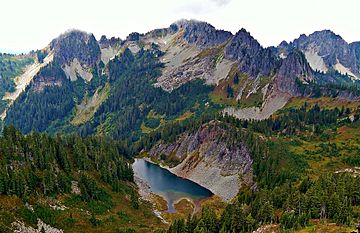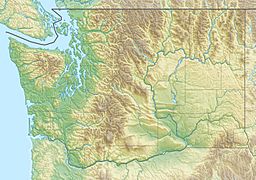Wahpenayo Peak facts for kids
Quick facts for kids Wahpenayo Peak |
|
|---|---|

Wahpenayo Peak (centered) seen from Denman Peak with Cliff Lake and Chutla Peak to far right
|
|
| Highest point | |
| Elevation | 6,231 ft (1,899 m) |
| Prominence | 791 ft (241 m) |
| Geography | |
| Location | Mount Rainier National Park Lewis County, Washington, U.S. |
| Parent range | Cascades |
| Topo map | USGS Wahpenayo Peak |
| Climbing | |
| Easiest route | Scrambling class 3 |
Wahpenayo Peak is a 6,231 ft summit in the Tatoosh Range which is a sub-range of the Cascade Range. It is located south of Mount Rainier within Mount Rainier National Park, in Lewis County of Washington state. The mountain is named for Wahpenayo, a native American chief who was the father-in-law of Indian Henry. Precipitation runoff on the south and east side of the peak drains into tributaries of the Cowlitz River, whereas the north side drains into tributaries of the Nisqually River.
Climate
Wahpenayo Peak is located in the marine west coast climate zone of western North America. Most weather fronts originate in the Pacific Ocean, and travel northeast toward the Cascade Mountains. As fronts approach, they are forced upward by the peaks of the Cascade Range (Orographic lift), causing them to drop their moisture in the form of rain or snowfall onto the Cascades. As a result, the west side of the North Cascades experiences high precipitation, especially during the winter months in the form of snowfall. During winter months, weather is usually cloudy, but, due to high pressure systems over the Pacific Ocean that intensify during summer months, there is often little or no cloud cover during the summer. Because of maritime influence, snow tends to be wet and heavy, resulting in high avalanche danger.
- Weather forecast: Wahpenayo Peak
- National Park Service web site: Mount Rainier National Park



